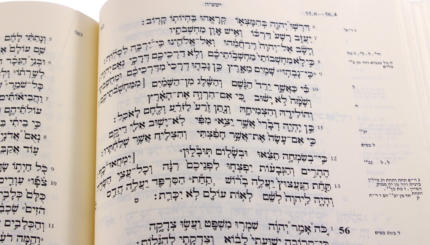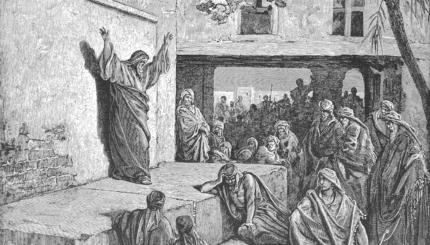Commentary on Parashat Nitzavim-Vayeilech, Deuteronomy 29:9-31:30
The first Shabbat of the Jewish year is called Shabbat Shuvah, which means the Sabbath of Return. Its name comes from the Haftarah which opens with the word “shuvah.” The Haftarah highlights themes of penitence and human reconciliation with God, appropriate for the week between Rosh Hashanah and Yom Kippur.
Hosea calls on a sinning people to return to God by pronouncing humble words, instead of offering animal sacrifice (14:3): “Instead of bulls we will pay the offering of our lips.” He promises that God will respond lovingly and will no longer be angry with Israel. Hosea describes God as dew that will nourish, and Israel as a blossoming lily, a strong tree in Lebanon, an olive tree, and a cypress. In the closing words of the haftarah, we learn that everyone gets what they deserve (14:10): “For the paths of the Lord are smooth; the righteous can walk on them, while sinners stumble on them.”
The selection from Micah is the text that is recited at Tashlich. This ceremony, in which we “cast our sins” into a body of water, is traditionally held on Rosh Hashanah, but it can actually be performed any time during the fall holiday season, up until Hoshanah Rabbah. The Micah text describes God as “forgiving iniquity and remitting transgression” (7:18), using language that is similar to some of the common refrains of the Yom Kippur liturgy.
The text from Joel that Ashkenazi communities add at the end of the Haftarah also highlights some of the seasonal themes. It opens with a reference to the shofar and a fast (2:15): “Blow a horn in Zion, solemnize a fast, proclaim an assembly!” Joel describes an entire congregation–old and young, men and women–coming together to purify themselves and get closer to God. This imagery reminds us of the task that awaits us on Yom Kippur.
With your help, My Jewish Learning can provide endless opportunities for learning, connection and discovery.
The scene Joel describes has some very positive results. Seeing the people’s sincerity, God takes action. He drives out Israel’s enemies, ensures that the rain falls at the right time, secures ample food for all, and makes it known that He dwells in the midst of Israel.
Reading these words on the Shabbat before Yom Kippur offers an encouraging, hopeful message. Human beings can return to God wholeheartedly, and the results can be magnificent.
Rosh Hashanah
Pronounced: roshe hah-SHAH-nah, also roshe ha-shah-NAH, Origin: Hebrew, the Jewish new year.
Shabbat
Pronounced: shuh-BAHT or shah-BAHT, Origin: Hebrew, the Sabbath, from sundown Friday to sundown Saturday.
Yom Kippur
Pronounced: yohm KIPP-er, also yohm kee-PORE, Origin: Hebrew, The Day of Atonement, the holiest day on the Jewish calendar and, with Rosh Hashanah, one of the High Holidays.
Haftarah
Pronounced: hahf-TOErah or hahf-TOE-ruh, Origin: Hebrew, a selection from one of the biblical books of the Prophets that is read in synagogue immediately following the Torah reading.


